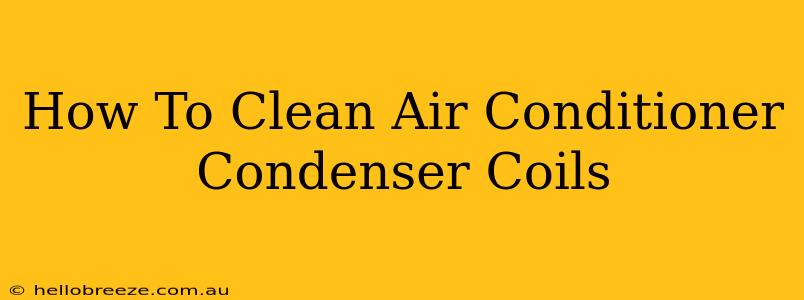Keeping your air conditioner running efficiently is crucial for both comfort and cost savings. A major factor in AC performance is the cleanliness of your condenser coils. Dirty coils restrict airflow, forcing your system to work harder and potentially leading to costly repairs or premature failure. This guide will walk you through how to clean your air conditioner condenser coils safely and effectively.
Why Clean Your Condenser Coils?
Before we dive into the cleaning process, let's understand why it's so important. Dirty condenser coils are a breeding ground for:
- Reduced Efficiency: Dust, dirt, leaves, and other debris clog the coils, hindering heat dissipation. This forces your AC unit to run longer and consume more energy to achieve the desired temperature. This translates directly to higher electricity bills.
- Increased Wear and Tear: Overworking your AC system due to clogged coils puts extra strain on the compressor and other components, leading to premature wear and tear, and ultimately, expensive repairs or replacement.
- Frozen Coils: Restricted airflow can cause the evaporator coil to freeze, further hindering performance and potentially damaging the system.
- Shortened Lifespan: Consistent neglect of coil cleaning significantly reduces the lifespan of your entire air conditioning unit.
Tools and Materials You'll Need:
Before you begin, gather these essential supplies:
- Garden Hose with a Spray Nozzle: This is your primary cleaning tool. A nozzle with adjustable spray settings is ideal.
- Coil Cleaning Brush (Optional but Recommended): A specialized brush helps dislodge stubborn debris from within the coil fins.
- Fin Comb (Optional): If the fins are bent, a fin comb will help straighten them, improving airflow.
- Safety Glasses: Protect your eyes from debris and cleaning solution.
- Gloves: Protect your hands from dirt and potential chemicals.
- Vacuum Cleaner with a Brush Attachment (Optional): Useful for pre-cleaning loose debris.
- Mild Detergent (Optional): For stubborn grime, a mild detergent solution can be helpful.
Step-by-Step Cleaning Process:
1. Safety First! Always disconnect the power to your air conditioner before starting any cleaning. This is crucial to prevent electrical shock. Locate the breaker or disconnect switch and turn off the power.
2. Preparation: Clear the area around the condenser unit of any obstructions like grass, leaves, or debris. This will provide better access and prevent accidental damage.
3. Pre-Cleaning (Optional): Use a vacuum cleaner with a brush attachment to remove loose dirt and debris from the coils. This will make the rinsing process more efficient.
4. Rinsing the Coils: Use your garden hose with a gentle spray setting to rinse the coils. Focus on thoroughly cleaning all areas of the coils, paying attention to any particularly dirty sections. Avoid using high-pressure water, as it could damage the delicate fins. A gentle, sweeping motion is best.
5. Using a Coil Cleaning Brush (Optional): If you have a coil cleaning brush, gently work it through the coils to dislodge stubborn dirt and debris that the rinsing might not have removed.
6. Straightening Bent Fins (Optional): If you notice any bent fins, use a fin comb to carefully straighten them. This will improve airflow and efficiency.
7. Final Rinse: Give the coils one final rinse to remove any remaining dirt or detergent residue.
8. Drying: Allow the coils to air dry completely before reconnecting the power. This is important to prevent any electrical hazards.
9. Restore Power: Once the coils are completely dry, reconnect the power to your air conditioner.
Maintaining Clean Condenser Coils:
Cleaning your condenser coils once or twice a year, especially before and after the peak cooling season, is recommended. Regular maintenance not only prolongs the lifespan of your AC unit but also helps you save on energy costs. Consider adding this task to your seasonal home maintenance checklist. You’ll thank yourself later!
When to Call a Professional:
While cleaning your condenser coils is a relatively simple DIY task, it's important to know when to call a professional HVAC technician:
- Extensive Damage: If you notice significant damage to the coils or other components, don’t attempt a repair yourself.
- Persistent Problems: If cleaning doesn't improve your AC's performance, there may be a more serious underlying issue.
- Lack of Confidence: If you're uncomfortable working with electrical appliances, it’s always best to call a professional.
By following these steps and maintaining regular cleaning, you can keep your air conditioner running efficiently, saving money and extending its lifespan. Remember safety first!

